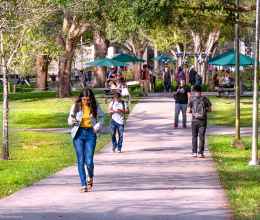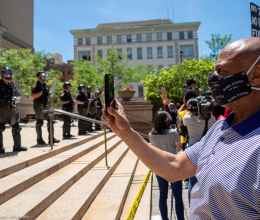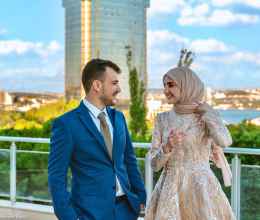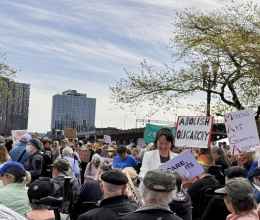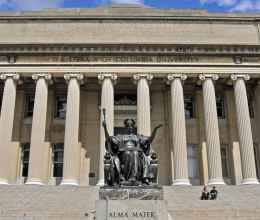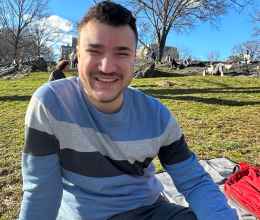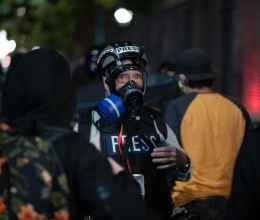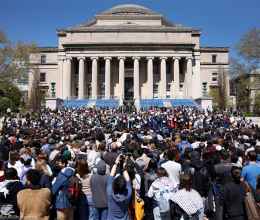
Our country has a proud history of protest and civil disobedience rooted in struggles against colonialism, war, slavery, racism, bodily and life autonomy, environmental justice, and other important societal issues. The following are just a few examples from U.S. history:
-
The Boston Tea Party – a historical event many students in the United States learn about in school – is arguably one of the most famous acts of civil disobedience in American history.
-
Henry Thoreau refused to pay federal taxes in protest of both slavery and the Mexican War.
-
Susan B. Anthony was arrested for voting illegally in 1872.
-
Martin Luther King Jr., Rosa Parks, Congressman John Lewis, and many other leaders and participants in the U.S. civil rights movement used civil disobedience to fight segregation and Jim Crow laws. Martin Luther King Jr. went to jail 29 times, and Congressman Lewis was arrested 40 times between 1960 and 1966 for protesting racist laws and practices. Many people of Jewish faith supported the civil rights movement; about 50 percent of the civil rights attorneys in the South during the 1960s identified as Jewish, as well as over 50 percent of the White people who went to Mississippi in 1964 to challenge Jim Crow laws.
-
Activism against the Vietnam War created one of the largest waves of civil disobedience in U.S. history, and it included activism by students on many U.S. campuses, as well as harmful, disproportionate responses by law enforcement. On May 4, 1970, the Ohio National Guard killed four and wounded nine students at Kent State during a rally opposing the Vietnam War’s expansion into Cambodia. On May 15, 1970, police killed two and wounded 12 students at an anti-Vietnam War protest at Jackson State College.
-
The Stonewall Riots were part of a long continuum of LGBTQ oppression and resistance and helped the U.S. LGBTQ movement build momentum and ultimately achieve freedoms and rights like marriage equality.
-
Environmental justice and climate activists have a long history of protests and civil disobedience too. For example, in 1982, 500 people were arrested in Warren County, North Carolina, for taking part in protests and civil disobedience over the dumping of toxic chemicals called PCBs.
Institutions of higher education – community colleges, four-year colleges, and universities – are important pillars of our democracy because free speech and academic freedom are their core values. It is imperative for higher education institutions to continue upholding these values – especially during periods of disquiet and tension – by supporting students, staff, and faculty who engage in protest and civil disobedience.
Campus leaders should prioritize the safety of students and all campus community members. However, often, police do not make people safer when students and community members are engaged in protest and civil disobedience.
There are too many instances of police harming peaceful protestors and escalating tensions and violence through the history of Oregon and the U.S. Recently, thousands of people who participated peacefully in the 2020 racial justice protests in Portland, including legal observers and journalists, experienced this painful reality – subjected to tear gas, impact munitions and rubber bullets, flash-bang or concussion grenades, police batons, and other forms of physical violence.
Also, police often do not make historically-disenfranchised communities safer, including Black, brown, and Indigenous people, people with disabilities, and low-income people. Like police departments across the country, the Portland Police Bureau has a long history of misconduct and violence against historically-disenfranchised communities, and they’ve shunned efforts to create effective accountability processes for police. In point of fact, after decades of abject failures by the City of Portland and Multnomah County District Attorney in addressing and preventing police misconduct and violence, 82% of Portland voters said yes to creating a Community Oversight Board for Police in 2020; however, the Portland Police Union is currently engaged in political maneuvers and copaganda to roll back this oversight board.
The history of protest and civil disobedience is an important reminder that the values of free speech have been and will continue to be vital to our democracy, civil liberties, and civil rights. We call on our institutions of higher education to protect our democracy by supporting, not harming, student and community activists – including those calling for an end to the direct and indirect support of the war in Gaza by the U.S. government and other American institutions.
